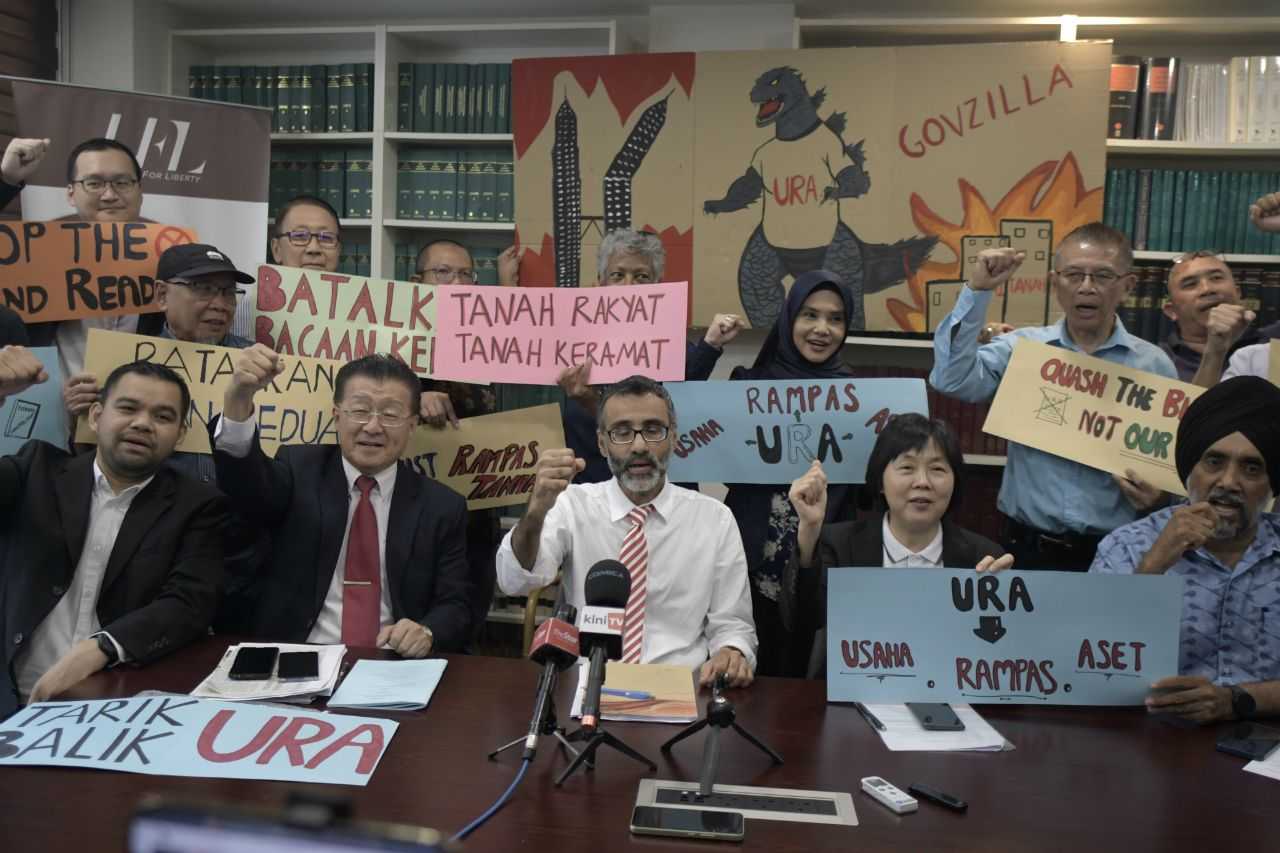Anger over URA grows as groups slam proposed law as tool to enrich developers
7 天前
More than a dozen organisations representing consumers, homeowners and neighbourhood groups have come together to denounce Putrajaya's refusal to back down from a new law which would give unprecedented power to the authorities to seize properties in the name of urban rejuvenation, with a prominent lawyer saying it was designed to enrich developers.
During a joint press conference by 14 groups representing neighbourhoods throughout the Klang Valley, vocal rights advocate Lawyers for Liberty (LFL) said the proposed Urban Renewal Act (URA) should be renamed the Developer Enrichment Act.
"They (property owners) are bullied, harassed and pestered in order to get their consent," said LFL adviser N Surendran, speaking at the press conference attended by close to 100 neighbourhood groups from apartments ranging from Petaling Jaya to Kampung Sungai Baru where residents are currently fighting eviction by the authorities.
Surendran, who earlier urged Putrajaya to withdraw the URA bill being pushed by Housing and Local Government Minister Nga Kor Ming, also reiterated that the proposed law was unconstitutional.
"The government has been saying that it's an 80% threshold, that it's higher than in Tokyo or China and such things. But the question is, how do you get consent? How does the developer get consent from homeowners? So the threshold is useless.
"If the residents have no lawyers, and the developers have lawyers, that's the end. They will be bullied. It's not real consent, it's manufactured consent," he said.
The move to introduce the URA has sparked anger among urban residents due to its reduction in the threshold for building owner consent from 100% to 80%.
Putrajaya has argued that the law will promote development in Kuala Lumpur, insisting that it will proceed with the second tabling of the URA bill.
This comes amid growing concern about the scope of power the law will provide for a minister to justify the forced acquisition of property on grounds that it is dilapidated and in need of "regeneration".
'Who benefits?'
Surendran said once the URA is in force, the government will invoke the Land Acquisition Act to take over condominiums, flats and apartments as long as there is 75% consent from their owners.
"If we give this kind of power to the government, what happens to the right to own property stated under Clause 13(1) of the Federal Constitution?
"Who benefits from this? The ones who benefit the most are the developers."
He said about 13% of areas in Kuala Lumpur had been identified for "redevelopment" through the URA, expected to generate a profit of RM350 billion in sales.
"How much of this value goes to the ordinary homeowners in flats, apartments and condominiums? The house owners are only going to get the minimal free development value, but the massive profit of RM350 billion will all go to the developers. Is that fair?" he asked.
URAs in Singapore, Hong Kong not for private developers
Surendran also took to task government leaders who say that countries such as Singapore and Hong Kong also apply laws similar to the URA.
"But their URA is not like our URA. Theirs is not developer-driven. If we look at our URA, everything is left to the developer.
"The developer goes and gets consent from the residents, who don't have legal advice. The developer applies for the Land Acquisition Act, which is a drastic act to be used on those who don't consent."
He said with the minister himself involved in the committee tasked with distributing projects to developers, the URA would not be based on open tender.
"Does that even make sense? How does that sit with the country's anti-corruption agenda?"
30-year threshold for buildings
National House Buyers Association secretary-general Chang Kim Loong slammed the government's proposed threshold which would allow buildings older than 30 years to be demolished for redevelopment with the consent of just 75% of owners.
He said the lifespan of a building is generally accepted to be 70 years, and that the Public Works Department had even said that this could extend to 100 years.
"So why 30 years? The ordinary life span of a human is 75 years. Retirement age is 55 to 60 years. Why 30 years? That's the question we need to ask the minister.
"My mum is 90 years old. If this law is passed, she will have to go through three cycles of re-development.
"Our house is our castle, nobody should take the house away from us. We earned it, we paid a housing loan of 35 years. But even before we pay off the loan, the URA comes in to say that the government has the power to redevelop."
Chang said among the excuses from the government to justify the URA was that redevelopment would upgrade facilities in old residential buildings.
"Why redevelop? Can you not refurbish it? One of the excuses is that because the elderly cannot use the stairs. Eh, install a lift lah! What's so difficult about installing a lift?"
He said instead, the government preferred to demolish entire buildings and build newer and taller structures.
"Who makes money out of it all? The government facilitates the law for private developers," he said.
Chang slammed Nga for citing the redevelopment of 1Razak Mansion and Kampung Kerinchi as examples of success.
He said both projects had 100% consent from property owners.
"He should not take credit for something that was not done by him. This was done under the old administration," he added.
He warned that the URA would put vast powers in the hands of Nga as the housing and local government minister.
"The all-powerful is the minister. Even the state authorities must refer to him.
"Why should we give power to one person?" Chang asked.
'Let MPs vote freely'
Last week, Surendran called the bill unconstitutional and warned that the process to obtain consent had been rife with threats of coercive force from developers.
"The process by which developers obtain this consent has also been mired in controversy in many cases involving compulsory acquisition, with residents complaining of undue pressure and threats," he said.
Surendran today demanded that the government allow MPs to vote independently on the bill.
"At the very least, the government should remove the whip from the MPs and allow them to vote according to conscience. Would the government dare to do that?" he asked, adding that the bill would certainly be passed due to fear of the anti-hopping law among ruling MPs.
In their joint statement, the groups said they were shocked when the bill was tabled on Aug 21, less than four months after the public consultation process.
"We are aggrieved, having hoped for many of our constructive suggestions to find their way either into the bill or subsequent subsidiary legislation.
"The sheer scale of callousness, neglect and misfeasance in the making of this new legislation is now clear to the rakyat. It has failed miserably to regulate the economic/contractual relationship between owners and developers in a fair, equitable and sustainable manner respecting the broader public interest," the statement said, adding that the contents of the bill tabled last week were the same as the draft first shared with the public earlier this year.
"That draft was deeply flawed, amounting to a denial of owners' fundamental rights to property enhancement and a transfer of those rights to developers in the name of 'privatisation'," said the statement endorsed and supported by the National House Buyers Association, KL Residents Action for Sustainable Development and Federation of Malaysians Consumers Associations or Fomca, among others.
The statement was also signed by a myriad of residents and Rukun Tetangga associations in the Klang Valley, including the Kampung Sungai Baru Action Committee led by vocal Malay land activist Rafidah Ibrahim, who is currently at the forefront of a stand-off with authorities seeking to evict them from the Malay enclave in the heart of Kuala Lumpur.
"If the government cannot do it right, it’s better not to do it at all," they said.
...Read the fullstory
It's better on the More. News app
✅ It’s fast
✅ It’s easy to use
✅ It’s free









